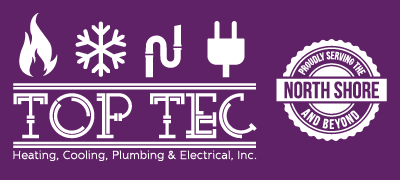
Buying your first home is an exhilarating experience. You’re probably juggling a dozen things or more to ensure you’re making the right choice. We believe that understanding your future HVAC system is crucial. The property’s HVAC system represents a significant investment and potential source of long-term costs, which is why due diligence helps all first-time homebuyers.
In the following guide, we’ll outline seven tips for discovering all there is to know about a home’s heating and cooling system. And if you want a more in-depth opinion from the pros, don't hesitate to contact TopTec. Our experienced team can weigh in on your options with industry insights that are second to none.
1. What Type of HVAC System Is It?
Start by clarifying what kind of HVAC system the home includes. Furnaces tend to last longer compared to air conditioners, and some of the latest types of HVAC equipment like heat pumps can offer average life spans that are impressively long. Getting the details on the make and specific model provides a clear idea of how much routine maintenance it might need.
2. How Long Ago Was the System Installed?
It’s just as smart to learn how old the HVAC system is when you're looking at a potential new home. For the most part, HVAC systems last about 10-12 years. Having the knowledge of when it was installed helps you anticipate future maintenance needs or when it might eventually stop working. Older systems may be more vulnerable to problems, so fiscal planning for a replacement unit might be needed faster than expected.
3. What Does the Warranty Cover?
Don’t forget to look into whether the HVAC system is still under warranty. If it is, that's great news because it can lower maintenance costs. HVAC warranties should take care of parts and labor, but specifics will vary. Review any terms that seem confusing to ensure you understand your coverage and any possible out-of-pocket costs.
4. When Was the Last Time It Received Maintenance?
Don't forget to check the maintenance history of the HVAC system, if this kind of history is accessible. This kind of information can reveal if the system constantly broke down or how often maintenance is performed. Inquire about key tasks such as changing the air filter, which can indicate it received regularly scheduled tune-ups.
5. Do You Know Its Energy Efficiency Ratings?
Finding a home that features an HVAC system with high energy efficiency can lead to more manageable utility bills and a smaller environmental impact. Look for the seasonal energy efficiency ratio (SEER) ratings for air conditioning and the annual fuel utilization efficiency (AFUE) for furnaces. The higher the SEER rating, the more efficient the cooling over the whole season, while higher AFUE ratings indicate that the fuel is more effectively burned for useable heat.
6. Have You Noticed Signs of Problems During Your Inspection?
Even without experience in HVAC systems, you can still take a moment to inspect the HVAC system yourself. Keep an eye out for potential issues that might have been overlooked. This can mean bizarre noises, spots with uneven heating or cooling and attempts to hide any serious damage.
7. Is an Experienced HVAC Technician Available to Help?
If you're unsure about the condition of the HVAC system, it's never a bad idea to get input from certified HVAC technicians. They can spot things you may not know about, including leaks in the refrigerant, wiring issues or flawed ductwork.
A Call with TopTec Simplifies Your Home-Buying Journey
Selecting your first home should be thrilling, and TopTec wants to ensure that doesn’t change. Get in touch with us at 847-362-0262. We can discuss how our HVAC services ease your mind, giving you what you need to make an offer with confidence.
